Content(ful) is King 👑
Content(ful) is King 👑
Content(ful) is King 👑
The story of a revolutionary product that is used by one-third of all Fortune 500 companies and skyrocketed its position to the coveted 🦄 zip-code
The story of a revolutionary product that is used by one-third of all Fortune 500 companies and skyrocketed its position to the coveted 🦄 zip-code
The story of a revolutionary product that is used by one-third of all Fortune 500 companies and skyrocketed its position to the coveted 🦄 zip-code



Evelyn Quan Wang is a Chinese American immigrant who runs a laundromat with her husband, Waymond. The laundromat is being audited by the IRS.
She's also planning a birthday party for her father (who's just arrived from Hong Kong)!
Meanwhile, her daughter is pushing her to accept her girlfriend, Becky.
The tension in her little world is palpable. And then, she discovers the multiverse.
A universe away, Evelyn is a world-renowned singer, performing for rapt audiences every night. In another one she’s a struggling gourmet chef. A kung-fu champion (and movie star 😄), an ape, and even - a rock.

Evelyn can tap into all these different lives by switching back and forth. And experience…everything, everywhere, all at once. [It’s a 95% on Rotten Tomatoes if you need further convincing]
Movies about the multiverse have exploded.
We've had Dr. Strange and the Avengers, Guardians of the Galaxy, Spiderman, and even that new Jared Leto film, Morbius, alone in the past couple of years.
We love switching between realities, dealing with different demands and obligations, and answering other people simultaneously.
Sound familiar? Because it should.
Sure, we can't jump from one universe to another (not yet, anyway) - but the multiverse is already here.
And it's on our devices.
Never before in the history of the universe (this universe, anyway) have humans been able to access and interact with so much information simultaneously.
But while we're constantly switching between our phones, laptops, Alexas, and tablets - and all that Content seems seamless - it isn't.
Or it wasn't until Contentful appeared.
This is the story of how one company revolutionized content management, pioneered the 'headless' CMS movement, and rose to the rarefied heights that only 0.006% of companies will achieve - to unicorn status.
🪨 Contentful, the Rosetta Stone for data
Contentful began by making it easy for companies engaged in multichannel marketing to create and deploy Content to any device.
Unlike legacy CMS, where Content is siloed and must be recreated for every new medium, Contentful's headless CMS is a fundamentally new infrastructure for building modern applications.
It unified all Content on a single hub, which can be deployed to any platform, making tailoring apps for different specs obsolete. 🤯
The perfect answer to all your ContentOps headaches—
Welcome to the new (headless) era of content management.
With Contentful, brands can adapt to a changing landscape by quickly scaling up digital offerings across the entire customer journey.
And when we say quick, we mean really quick!
What used to take weeks takes minutes with Contentful.
And the results speak for themselves.
On average, the company helps brands achieve a 60% increase in eCommerce conversion, 5x faster load times, a 3x increase in conversion from online store search, and a 13% increase in average order value.
With numbers like that, it's no surprise that over half a million developers and over 30 percent of the Fortune 500 rely on Contentful.
Today, Contentful has moved on from its headless CMS approach to become a platform that lets developers and designers build innovative things — not just websites and apps, but the technology that powers virtual reality, cars, ships, the internet of things, and more.
But the revolution in content management began not with a bang, but with a whimper.
⚡ Frustration, the mother of all good ideas
Berlin, 2011. Sascha Konietzke had been in tech for a few years, founded two startups, and worked as a freelance backend developer while studying for his MBA.
But work was seriously frustrating him.
"I was working with agencies to build first-generation mobile apps for brands. Many apps contain Content such as product information, marketing offers, or points of interest. At that time, content management systems (CMSes)…were all optimized to manage page-centric HTML websites—not to serve Content to native mobile apps. As a developer, I was frustrated with the status quo and thought there must be a better way. When I didn't find anything online, I experimented with building a solution myself…" - Sascha Konietzke.
While working on this solution, he met another young developer, Paolo Negri - who'd moved to Berlin from his native Milan.
Sascha was then on his third startup - Thriventures, which he'd founded to create this new solution.
Negri was super excited by Sascha's idea and decided to work together. Their initial product, StorageRoom, helped take Content from digital files and made it repurposable in mobile apps.
This picked up some 1,000 customers, primarily portable app generators and agencies.
But then they realized their idea could be much more significant.
What if they didn't just deploy to mobile apps but created a solution that could be used on any device?
…So that was really the genesis of the company, figuring out a way to make the Content that is going to be in the world accessible to developers very quickly, again, on any device, so you can deliver it at any time." - Sascha Konietzke
In August 2012, Thriventures was renamed Contentful, with Paolo as co-founder. 🙌
Konietzke and Negri set out to build the developers' dream: a cloud-first, API-driven CMS, one that was unified, structured, and ready to deploy to any digital channel.
Since then, Contentful has:
Defined a new category for themselves - headless CMS - and emerged as the clear category leader for content management - head and shoulders above the competition (pun totally intended!)
Raised almost $350m in funding from top investors, including Benchmark, Tiger Global, General Catalyst, Sapphire, Salesforce Ventures, Balderton, and Point Nine.
Scaled from 12 employees to 800+ in 6 years
Achieved unicorn status (2021) with a valuation of $3 billion
Been adopted by some of the world's biggest brands - IKEA, Electronic Arts, Spotify, Lyft, Porsche, WeWork, and Vodafone, to name just a few of their 2000+ clients
And how did they get here?
Three words: Product-led growth.
✊🏼 PLG or bust
Konietzke and Negri were developers first, so they focused on creating the best possible product that would excite developers, content managers, and marketers alike.
The API-centric approach to content management was still nascent when they began. But Contentful wanted to grow. Fast.
Steve Sloan, Contentful's CEO, believes this was the primary motivator behind the founders' decision to adopt a PLG approach.
"Product-led growth makes the most sense if you want to get really big. [We asked ourselves whether] all that friction in the process - is that really going to help us get more customers, more quickly?" - Steve Sloan, CEO
Their key clients were midmarket companies, enterprise customers, and venture-backed startups - most of whom were used to (and frustrated by) the lengthy process of onboarding a CMS, which often included 3-5 year lock-in contracts.

But Contentful wasn’t going to be yet another run-off-the-mill CMS.
🏁 Free = freedom
Instead, they had a super easy signup process with a 14-day free trial, allowing clients working in teams access to multiple workspaces and adding up to 100 team members.
And you could sign up without the need for credit card info, lowering barriers to entry.
Contentful also offered a Premium trial option to help large companies test out enterprise features - something that's pretty unique.
This enabled them to onboard many enterprise customers who didn't want to pay a considerable amount upfront for legacy software solutions.
This reduced the barrier to adoption like crazy - significantly impacting the number of high-paying enterprise customers!
In 2020, Contentful introduced a Freemium option - users could work in a single space with up to 5 other team members. This helped bring in early-stage startups and small businesses who needed their services (but couldn't always afford the $489/month price tag).
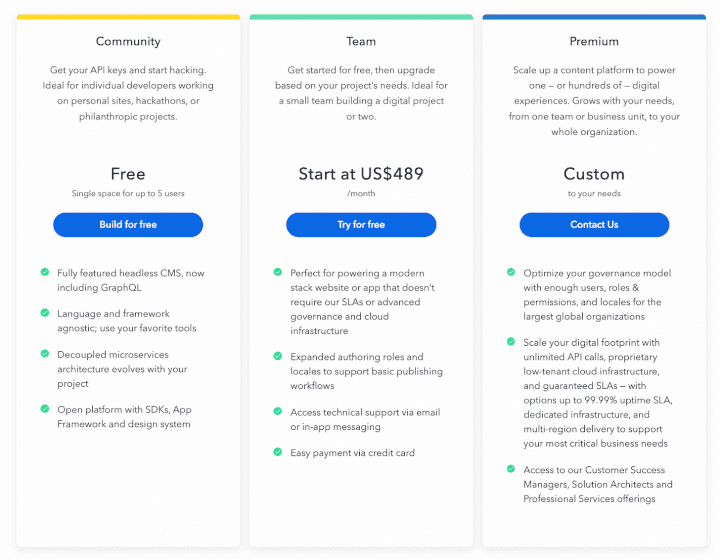
And when these startups got big? Contentful was there to help them scale with a premium version.
📽️ Customized product demos
There are normal personalized demos, and then there's what Contentful did.
The company currently hosts a page of demos for every use case imaginable.
Whether you want to create a Support Knowledge base, build a modern stack website, or unify disparate content sources; there's a demo related to your unique needs and requirements.
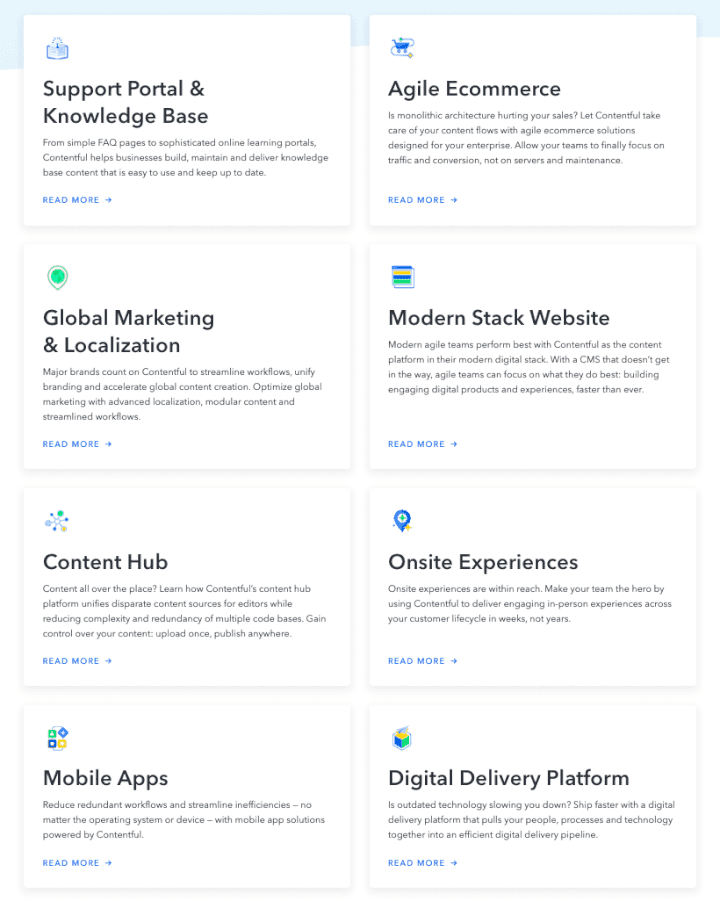
Contentful's Premium demo option allows prospects to connect with a team for a live demo.
And if that doesn't suit you, you can watch a recorded demo - for specific use cases. (Gated, of course!)
📱Apps for everyone!
In 2021, Contentful launched two new apps - Compose and Launch to empower content creators, editors, and marketers to adapt and schedule Content across channels without developer support.
Yep, that’s right. No more dependencies.
They realized that programs that allowed non-technical teams - like marketing or content creators- to engage and build digital experiences are crucial to moving forward in a digital-first era.
Everyone is rolling up their sleeves to create engaging customer experiences together. And this agility is a critical competitive advantage.
This led to faster TTV + increased the scalability and flexibility of an already amazingly flexible product.
🤑 Transparent Pricing!
As part of the PLG strategy, Contentful has a super simple, transparent pricing structure.
If you need more than 1 user, upgrading from the free to the Teams version will cost you $489/month (after the free trial).
This standard pricing strategy makes sense for their customers - mid-market B2B and helps them offer the free forever version to grow a long-term client base. Win-win-win!
Besides the platform, Contentful also offers a range of services, including training, workshops, and professional advisory services that can be customized on your monthly plan.
Companies using the enterprise package get unique features such as single sign-on, API white-labeling, a user management API, and more.
🔮 Magical customer experiences
Contentful was off to a great start.
They'd effectively built their own product niche and created a whole new approach to content management - and while it was great to draw customers to them, they needed to focus on retention.
So, they got obsessed with their customers.
Good customer experiences just wouldn’t cut it.
They simply had to be magical. ✨
🏹 Strategic onboarding
It started right from their onboarding - where they offered strategic and tactical support to customers.
Contentful's onboarding process is designed around the type of company you are, your role in the organization, and what you want to achieve.
Once you've signed up on the platform, the remaining steps are customized to specific types of companies and user requirements.
There's also a help center along with end-to-end customer support for troubleshooting.
Further reducing friction, decreasing TTV, and empowering the all-important higher ACV!
☝🏽Customer education is #1
Since they are the pioneers in the space, knowledge sharing and customer education are a big priority for Contentful.
And it begins as soon as you sign up with targeted emails for your needs.
You can also access free, self-paced training at the learning center (available for free and paid customers!) and live training through virtual classrooms - although this costs $4-600 for workshops.
Contentful also offers users a path to certification($250), with a discount for teams.
Workshops and training can be delivered to individual sections, either separately or as part of a more extensive Contentful services engagement - continuing their flexible approach.
🌱 Professional Services to grow your business
And in case you were still in the dark about leveraging Contentful for omnichannel marketing - Contentful's also got a “do-it-for-you” model with dedicated specialists for customized guidance on near-term planning and long-term strategy and implementation services for advanced use cases.
Software sold ≠ Software used.
To turn this problem statement, over its head; Contentful differentiates itself by literally doing it all for you!
Talk about a seamless customer experience.
🧑🏻💻 Keeping developers happy!
Sascha and Paolo were developers first, so they focused on empowering developers. Contentful is an active part of the open-source community and often gets excellent advice and feedback from sharing new developments with devs first.
"One of the things I love about serving developers is every day, they show us a new thing that's possible with the platform because they have a brilliant idea about how to use it...And so, in many ways, we follow our developer customers." - Steve Sloan, CEO
And boy, did the community give back!
Like other PLG companies, like Mutiny, Descript, and Statsig; Contentful has a niche group of users, who are also their staunchest supporters. Contentful's rapid growth, with revenue roughly doubling yearly since 2019, was fueled by developers looking for faster and better ways to build digital experiences. It's attracted more than 400,000 developers and users who integrate Contentful with other third-party services.
In fact, Contentful receives 38x more Javascript SDK downloads than other similar enterprise content solutions - all because of developers!
In 2021 Contentful released an App Framework, which spurred an additional wave of technology partners to offer integrations with Contentful.
👫 Community matters
A great way to educate new customers and keep them happy and connected to your product is through a community.
Contentful realized this early on. Besides their vast developer community (which includes a separate portal, Slack community, YouTube, GitHub, and Twitch channels), they also stay closely connected with their non-tech customers.
Users can access a Slack community, support portal, online chat (on their web app), and a monthly newsletter.
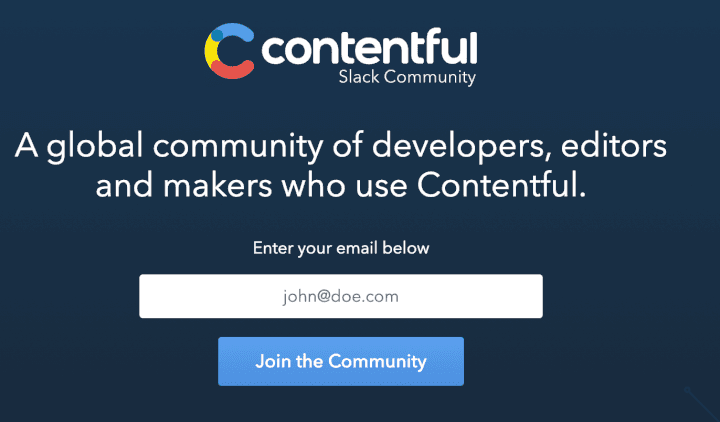
They also host events and roadshows in Berlin, NY, London, and SF every year - for people to connect and meet with the Contentful team - and each other!
An entirely new niche? Check.
A way for all of ‘em to vibe together? Double Check.
📝 Content for everyone
Unsurprisingly, a company focused on delivering Content has a stellar content strategy. Working off their USP of diversified Content - Contentful has something for everyone and on every medium.
The goal? Provide standalone value at every step, on every medium that makes sense.
This includes:
Blog 📄
The Contentful Blog primarily drives its SEO strategy. With categories like Developers (feature mechanisms and updates for developers), Strategy (expert guidance on unified content strategies to drive business goals), and Product (for feature updates); the blog garners over 110K+ organic traffic.
They rank for 48K+ organic keywords, including long-tail relevant keywords across keyword difficulty such as content management system for mobile app (KD: 6), and content management as a service (KD:56).
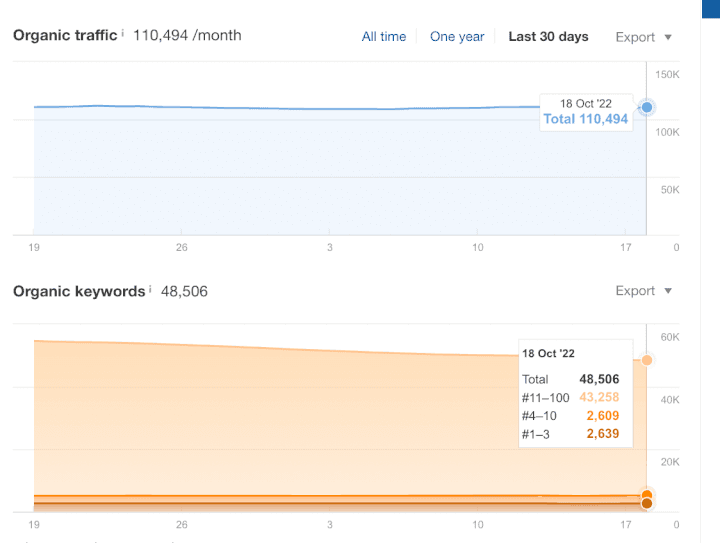
Case studies 💻
No proof of work, is bigger than social proof, especially when your clientele boasts of heavyweights like Atlassian, Shiseido, Siemens, and even, Notion 💪
Prospects can explore customer stories via industry, use case, and even the type of plan they have - to see how Contentful helps clients precisely like them. What's even crazier is that they've also got success stories for the free version!
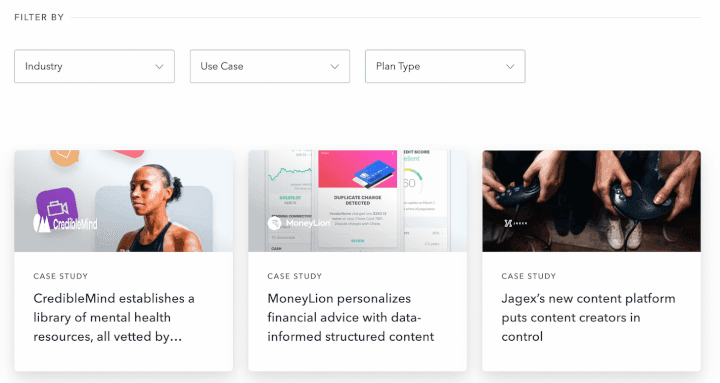
YouTube channel 🎥
They've got a ton of videos for clients and prospects, for both BoFu and MoFu stages- with educational videos that include how-tos for customers during the free trial.
Ebooks and Whitepapers
This helps position Contentful as a thought leader in the space while also delivering standalone value to potential customers, and acting as lead magnets. To access them, prospects must enter their info, pulling them into the Contentful marketing nurture flow!
In-person Events 🎉
In case you're tired of digital, Contentful also runs an offline branded annual event - Fast Forward, which showcases the most significant content trends and invites big execs and industry leaders to speak.
The event also includes a thread of engaging, in-person customer and partner events to finally seal off their mission of complete market domination. 🐅
🏆 API + Marketplace = Integration FTW
Contentful never stops thinking about its customers.
And what do customers love most in today's digital-first world? Integrations. (Well, it's one of the things they love).
With the launch of the Contentful API in 2020, teams could seamlessly integrate many apps and extend the capabilities of Contentful's platform through third-party integrations and custom workflows.
Contentful's App Marketplace has seen an increase of over 150% in apps created in the Contentful Marketplace since 2021. The platform now performs an average of 1.8 billion API calls daily for over 30% of the Fortune 500 and thousands of other global brands, partners, and organizations.
You can connect over 100 apps, including platforms for Marketing (Writer, Wistia, Typeform), Google Analytics, Shopify (and other commerce apps), Jira, and Slack.
The best part?
Yes, it actually gets better than this—the marketplace is for everyone, so you don't need to be a tech expert to use it!
🌈 Partnerships for end-to-end solutions
Early on, Contentful realized the importance of partnerships.
Some early adopters included design agencies and consultants that used Contentful to deliver seamless digital experiences for their clients. Sascha realized this could be a big market - agencies would use their services and get Contentful in front of their clients. And Contentful could offer agency services to prospects that wanted to deliver Content across different touchpoints - and needed help.
And so the partner program was born.
Today Contentful has become a core layer of digital agencies' delivery stacks for their clients.
Contentful's partners include Solution partners (including top agencies like AKQA, R/GA, Appnovation, and HUGE) and Tech Partners that provide platforms and applications that integrate with Contentful (AWS, Atlassian, Gatsby, Netlify, and others).
Their extensive partner ecosystem helps digital brands build, launch, and ship websites and Content faster, providing increased customer value.
📈 Product-led Sales
While creating a new product niche for yourself sounds super cool, it makes things difficult for Sales.
Before the idea of a headless CMS reached mainstream adoption - no one knew what they were talking about.
So, while product-led growth opens the floodgates at top-of-the-funnel with its free trial, the sales team is what eventually seals the deal— ensuring that the money hits the bank. 💸
This is not unlike what many of the most successful PLS cos. such as Paddle and Appcues which have a successful hybrid motion.
Contentful's current Sales Director, Christopher Carrow, champions this product-led sales approach. With a stellar team of SDRs, AEs, SalesOps, and Sales Leaders; the function owns the revenue function by prospecting, nurturing, and closing new customers, as well as “land-and-expand” within existing accounts.
Contentful's list of over 2000+ customers including Warby Parker, Atlassian, Vodafone, Scotiabank, Peloton, Danone, Shishido, Equinox, Costa Coffee, Chanel, Bang & Olufsen, to name some - means that it must be working!
⏭️ What's next
So what do you do after you've disrupted a legacy industry, creating a new niche, and become a global leader for Content?
Is there anything left?
Steve Sloan and his founders seem to think there is— cause they aren't slowing down just yet.
You don't become a unicorn if you're not continuously thinking on your feet.
In the next few years, Contentful will invest quite a bit into R&D to help customers solve adjacent problems.
It's also expanding its global marketing and sales teams as it moves into new markets beyond the US.
We've even heard rumors Contentful is planning to go public - which could take their valuation to $5 billion! 🤫
They definitely weren’t lying when they said, Content(ful) is King 👑
Evelyn Quan Wang is a Chinese American immigrant who runs a laundromat with her husband, Waymond. The laundromat is being audited by the IRS.
She's also planning a birthday party for her father (who's just arrived from Hong Kong)!
Meanwhile, her daughter is pushing her to accept her girlfriend, Becky.
The tension in her little world is palpable. And then, she discovers the multiverse.
A universe away, Evelyn is a world-renowned singer, performing for rapt audiences every night. In another one she’s a struggling gourmet chef. A kung-fu champion (and movie star 😄), an ape, and even - a rock.

Evelyn can tap into all these different lives by switching back and forth. And experience…everything, everywhere, all at once. [It’s a 95% on Rotten Tomatoes if you need further convincing]
Movies about the multiverse have exploded.
We've had Dr. Strange and the Avengers, Guardians of the Galaxy, Spiderman, and even that new Jared Leto film, Morbius, alone in the past couple of years.
We love switching between realities, dealing with different demands and obligations, and answering other people simultaneously.
Sound familiar? Because it should.
Sure, we can't jump from one universe to another (not yet, anyway) - but the multiverse is already here.
And it's on our devices.
Never before in the history of the universe (this universe, anyway) have humans been able to access and interact with so much information simultaneously.
But while we're constantly switching between our phones, laptops, Alexas, and tablets - and all that Content seems seamless - it isn't.
Or it wasn't until Contentful appeared.
This is the story of how one company revolutionized content management, pioneered the 'headless' CMS movement, and rose to the rarefied heights that only 0.006% of companies will achieve - to unicorn status.
🪨 Contentful, the Rosetta Stone for data
Contentful began by making it easy for companies engaged in multichannel marketing to create and deploy Content to any device.
Unlike legacy CMS, where Content is siloed and must be recreated for every new medium, Contentful's headless CMS is a fundamentally new infrastructure for building modern applications.
It unified all Content on a single hub, which can be deployed to any platform, making tailoring apps for different specs obsolete. 🤯
The perfect answer to all your ContentOps headaches—
Welcome to the new (headless) era of content management.
With Contentful, brands can adapt to a changing landscape by quickly scaling up digital offerings across the entire customer journey.
And when we say quick, we mean really quick!
What used to take weeks takes minutes with Contentful.
And the results speak for themselves.
On average, the company helps brands achieve a 60% increase in eCommerce conversion, 5x faster load times, a 3x increase in conversion from online store search, and a 13% increase in average order value.
With numbers like that, it's no surprise that over half a million developers and over 30 percent of the Fortune 500 rely on Contentful.
Today, Contentful has moved on from its headless CMS approach to become a platform that lets developers and designers build innovative things — not just websites and apps, but the technology that powers virtual reality, cars, ships, the internet of things, and more.
But the revolution in content management began not with a bang, but with a whimper.
⚡ Frustration, the mother of all good ideas
Berlin, 2011. Sascha Konietzke had been in tech for a few years, founded two startups, and worked as a freelance backend developer while studying for his MBA.
But work was seriously frustrating him.
"I was working with agencies to build first-generation mobile apps for brands. Many apps contain Content such as product information, marketing offers, or points of interest. At that time, content management systems (CMSes)…were all optimized to manage page-centric HTML websites—not to serve Content to native mobile apps. As a developer, I was frustrated with the status quo and thought there must be a better way. When I didn't find anything online, I experimented with building a solution myself…" - Sascha Konietzke.
While working on this solution, he met another young developer, Paolo Negri - who'd moved to Berlin from his native Milan.
Sascha was then on his third startup - Thriventures, which he'd founded to create this new solution.
Negri was super excited by Sascha's idea and decided to work together. Their initial product, StorageRoom, helped take Content from digital files and made it repurposable in mobile apps.
This picked up some 1,000 customers, primarily portable app generators and agencies.
But then they realized their idea could be much more significant.
What if they didn't just deploy to mobile apps but created a solution that could be used on any device?
…So that was really the genesis of the company, figuring out a way to make the Content that is going to be in the world accessible to developers very quickly, again, on any device, so you can deliver it at any time." - Sascha Konietzke
In August 2012, Thriventures was renamed Contentful, with Paolo as co-founder. 🙌
Konietzke and Negri set out to build the developers' dream: a cloud-first, API-driven CMS, one that was unified, structured, and ready to deploy to any digital channel.
Since then, Contentful has:
Defined a new category for themselves - headless CMS - and emerged as the clear category leader for content management - head and shoulders above the competition (pun totally intended!)
Raised almost $350m in funding from top investors, including Benchmark, Tiger Global, General Catalyst, Sapphire, Salesforce Ventures, Balderton, and Point Nine.
Scaled from 12 employees to 800+ in 6 years
Achieved unicorn status (2021) with a valuation of $3 billion
Been adopted by some of the world's biggest brands - IKEA, Electronic Arts, Spotify, Lyft, Porsche, WeWork, and Vodafone, to name just a few of their 2000+ clients
And how did they get here?
Three words: Product-led growth.
✊🏼 PLG or bust
Konietzke and Negri were developers first, so they focused on creating the best possible product that would excite developers, content managers, and marketers alike.
The API-centric approach to content management was still nascent when they began. But Contentful wanted to grow. Fast.
Steve Sloan, Contentful's CEO, believes this was the primary motivator behind the founders' decision to adopt a PLG approach.
"Product-led growth makes the most sense if you want to get really big. [We asked ourselves whether] all that friction in the process - is that really going to help us get more customers, more quickly?" - Steve Sloan, CEO
Their key clients were midmarket companies, enterprise customers, and venture-backed startups - most of whom were used to (and frustrated by) the lengthy process of onboarding a CMS, which often included 3-5 year lock-in contracts.

But Contentful wasn’t going to be yet another run-off-the-mill CMS.
🏁 Free = freedom
Instead, they had a super easy signup process with a 14-day free trial, allowing clients working in teams access to multiple workspaces and adding up to 100 team members.
And you could sign up without the need for credit card info, lowering barriers to entry.
Contentful also offered a Premium trial option to help large companies test out enterprise features - something that's pretty unique.
This enabled them to onboard many enterprise customers who didn't want to pay a considerable amount upfront for legacy software solutions.
This reduced the barrier to adoption like crazy - significantly impacting the number of high-paying enterprise customers!
In 2020, Contentful introduced a Freemium option - users could work in a single space with up to 5 other team members. This helped bring in early-stage startups and small businesses who needed their services (but couldn't always afford the $489/month price tag).

And when these startups got big? Contentful was there to help them scale with a premium version.
📽️ Customized product demos
There are normal personalized demos, and then there's what Contentful did.
The company currently hosts a page of demos for every use case imaginable.
Whether you want to create a Support Knowledge base, build a modern stack website, or unify disparate content sources; there's a demo related to your unique needs and requirements.

Contentful's Premium demo option allows prospects to connect with a team for a live demo.
And if that doesn't suit you, you can watch a recorded demo - for specific use cases. (Gated, of course!)
📱Apps for everyone!
In 2021, Contentful launched two new apps - Compose and Launch to empower content creators, editors, and marketers to adapt and schedule Content across channels without developer support.
Yep, that’s right. No more dependencies.
They realized that programs that allowed non-technical teams - like marketing or content creators- to engage and build digital experiences are crucial to moving forward in a digital-first era.
Everyone is rolling up their sleeves to create engaging customer experiences together. And this agility is a critical competitive advantage.
This led to faster TTV + increased the scalability and flexibility of an already amazingly flexible product.
🤑 Transparent Pricing!
As part of the PLG strategy, Contentful has a super simple, transparent pricing structure.
If you need more than 1 user, upgrading from the free to the Teams version will cost you $489/month (after the free trial).
This standard pricing strategy makes sense for their customers - mid-market B2B and helps them offer the free forever version to grow a long-term client base. Win-win-win!
Besides the platform, Contentful also offers a range of services, including training, workshops, and professional advisory services that can be customized on your monthly plan.
Companies using the enterprise package get unique features such as single sign-on, API white-labeling, a user management API, and more.
🔮 Magical customer experiences
Contentful was off to a great start.
They'd effectively built their own product niche and created a whole new approach to content management - and while it was great to draw customers to them, they needed to focus on retention.
So, they got obsessed with their customers.
Good customer experiences just wouldn’t cut it.
They simply had to be magical. ✨
🏹 Strategic onboarding
It started right from their onboarding - where they offered strategic and tactical support to customers.
Contentful's onboarding process is designed around the type of company you are, your role in the organization, and what you want to achieve.
Once you've signed up on the platform, the remaining steps are customized to specific types of companies and user requirements.
There's also a help center along with end-to-end customer support for troubleshooting.
Further reducing friction, decreasing TTV, and empowering the all-important higher ACV!
☝🏽Customer education is #1
Since they are the pioneers in the space, knowledge sharing and customer education are a big priority for Contentful.
And it begins as soon as you sign up with targeted emails for your needs.
You can also access free, self-paced training at the learning center (available for free and paid customers!) and live training through virtual classrooms - although this costs $4-600 for workshops.
Contentful also offers users a path to certification($250), with a discount for teams.
Workshops and training can be delivered to individual sections, either separately or as part of a more extensive Contentful services engagement - continuing their flexible approach.
🌱 Professional Services to grow your business
And in case you were still in the dark about leveraging Contentful for omnichannel marketing - Contentful's also got a “do-it-for-you” model with dedicated specialists for customized guidance on near-term planning and long-term strategy and implementation services for advanced use cases.
Software sold ≠ Software used.
To turn this problem statement, over its head; Contentful differentiates itself by literally doing it all for you!
Talk about a seamless customer experience.
🧑🏻💻 Keeping developers happy!
Sascha and Paolo were developers first, so they focused on empowering developers. Contentful is an active part of the open-source community and often gets excellent advice and feedback from sharing new developments with devs first.
"One of the things I love about serving developers is every day, they show us a new thing that's possible with the platform because they have a brilliant idea about how to use it...And so, in many ways, we follow our developer customers." - Steve Sloan, CEO
And boy, did the community give back!
Like other PLG companies, like Mutiny, Descript, and Statsig; Contentful has a niche group of users, who are also their staunchest supporters. Contentful's rapid growth, with revenue roughly doubling yearly since 2019, was fueled by developers looking for faster and better ways to build digital experiences. It's attracted more than 400,000 developers and users who integrate Contentful with other third-party services.
In fact, Contentful receives 38x more Javascript SDK downloads than other similar enterprise content solutions - all because of developers!
In 2021 Contentful released an App Framework, which spurred an additional wave of technology partners to offer integrations with Contentful.
👫 Community matters
A great way to educate new customers and keep them happy and connected to your product is through a community.
Contentful realized this early on. Besides their vast developer community (which includes a separate portal, Slack community, YouTube, GitHub, and Twitch channels), they also stay closely connected with their non-tech customers.
Users can access a Slack community, support portal, online chat (on their web app), and a monthly newsletter.

They also host events and roadshows in Berlin, NY, London, and SF every year - for people to connect and meet with the Contentful team - and each other!
An entirely new niche? Check.
A way for all of ‘em to vibe together? Double Check.
📝 Content for everyone
Unsurprisingly, a company focused on delivering Content has a stellar content strategy. Working off their USP of diversified Content - Contentful has something for everyone and on every medium.
The goal? Provide standalone value at every step, on every medium that makes sense.
This includes:
Blog 📄
The Contentful Blog primarily drives its SEO strategy. With categories like Developers (feature mechanisms and updates for developers), Strategy (expert guidance on unified content strategies to drive business goals), and Product (for feature updates); the blog garners over 110K+ organic traffic.
They rank for 48K+ organic keywords, including long-tail relevant keywords across keyword difficulty such as content management system for mobile app (KD: 6), and content management as a service (KD:56).

Case studies 💻
No proof of work, is bigger than social proof, especially when your clientele boasts of heavyweights like Atlassian, Shiseido, Siemens, and even, Notion 💪
Prospects can explore customer stories via industry, use case, and even the type of plan they have - to see how Contentful helps clients precisely like them. What's even crazier is that they've also got success stories for the free version!

YouTube channel 🎥
They've got a ton of videos for clients and prospects, for both BoFu and MoFu stages- with educational videos that include how-tos for customers during the free trial.
Ebooks and Whitepapers
This helps position Contentful as a thought leader in the space while also delivering standalone value to potential customers, and acting as lead magnets. To access them, prospects must enter their info, pulling them into the Contentful marketing nurture flow!
In-person Events 🎉
In case you're tired of digital, Contentful also runs an offline branded annual event - Fast Forward, which showcases the most significant content trends and invites big execs and industry leaders to speak.
The event also includes a thread of engaging, in-person customer and partner events to finally seal off their mission of complete market domination. 🐅
🏆 API + Marketplace = Integration FTW
Contentful never stops thinking about its customers.
And what do customers love most in today's digital-first world? Integrations. (Well, it's one of the things they love).
With the launch of the Contentful API in 2020, teams could seamlessly integrate many apps and extend the capabilities of Contentful's platform through third-party integrations and custom workflows.
Contentful's App Marketplace has seen an increase of over 150% in apps created in the Contentful Marketplace since 2021. The platform now performs an average of 1.8 billion API calls daily for over 30% of the Fortune 500 and thousands of other global brands, partners, and organizations.
You can connect over 100 apps, including platforms for Marketing (Writer, Wistia, Typeform), Google Analytics, Shopify (and other commerce apps), Jira, and Slack.
The best part?
Yes, it actually gets better than this—the marketplace is for everyone, so you don't need to be a tech expert to use it!
🌈 Partnerships for end-to-end solutions
Early on, Contentful realized the importance of partnerships.
Some early adopters included design agencies and consultants that used Contentful to deliver seamless digital experiences for their clients. Sascha realized this could be a big market - agencies would use their services and get Contentful in front of their clients. And Contentful could offer agency services to prospects that wanted to deliver Content across different touchpoints - and needed help.
And so the partner program was born.
Today Contentful has become a core layer of digital agencies' delivery stacks for their clients.
Contentful's partners include Solution partners (including top agencies like AKQA, R/GA, Appnovation, and HUGE) and Tech Partners that provide platforms and applications that integrate with Contentful (AWS, Atlassian, Gatsby, Netlify, and others).
Their extensive partner ecosystem helps digital brands build, launch, and ship websites and Content faster, providing increased customer value.
📈 Product-led Sales
While creating a new product niche for yourself sounds super cool, it makes things difficult for Sales.
Before the idea of a headless CMS reached mainstream adoption - no one knew what they were talking about.
So, while product-led growth opens the floodgates at top-of-the-funnel with its free trial, the sales team is what eventually seals the deal— ensuring that the money hits the bank. 💸
This is not unlike what many of the most successful PLS cos. such as Paddle and Appcues which have a successful hybrid motion.
Contentful's current Sales Director, Christopher Carrow, champions this product-led sales approach. With a stellar team of SDRs, AEs, SalesOps, and Sales Leaders; the function owns the revenue function by prospecting, nurturing, and closing new customers, as well as “land-and-expand” within existing accounts.
Contentful's list of over 2000+ customers including Warby Parker, Atlassian, Vodafone, Scotiabank, Peloton, Danone, Shishido, Equinox, Costa Coffee, Chanel, Bang & Olufsen, to name some - means that it must be working!
⏭️ What's next
So what do you do after you've disrupted a legacy industry, creating a new niche, and become a global leader for Content?
Is there anything left?
Steve Sloan and his founders seem to think there is— cause they aren't slowing down just yet.
You don't become a unicorn if you're not continuously thinking on your feet.
In the next few years, Contentful will invest quite a bit into R&D to help customers solve adjacent problems.
It's also expanding its global marketing and sales teams as it moves into new markets beyond the US.
We've even heard rumors Contentful is planning to go public - which could take their valuation to $5 billion! 🤫
They definitely weren’t lying when they said, Content(ful) is King 👑
Related Articles




Behavioral Retargeting: A Game-Changer in the Cookieless Era
Unlock the power of behavioral retargeting for the cookieless future! Learn how it personalizes ads & boosts conversions. #behavioralretargeting
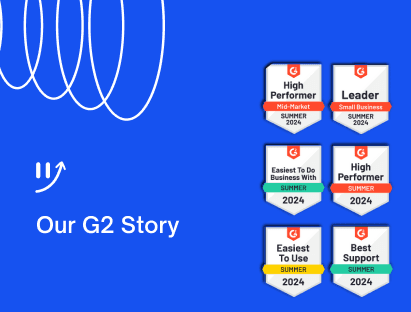



All of Toplyne's 40+ Badges in the G2 Spring Reports
Our customers awarded us 40+ badges in G2's Summer Report 2024.




Unlocking the Full Potential of Google PMax Campaigns: Mastering Audience Selection to Double Your ROAS
Copyright © Toplyne Labs PTE Ltd. 2024
Copyright © Toplyne Labs PTE Ltd. 2024
Copyright © Toplyne Labs PTE Ltd. 2024
Copyright © Toplyne Labs PTE Ltd. 2024